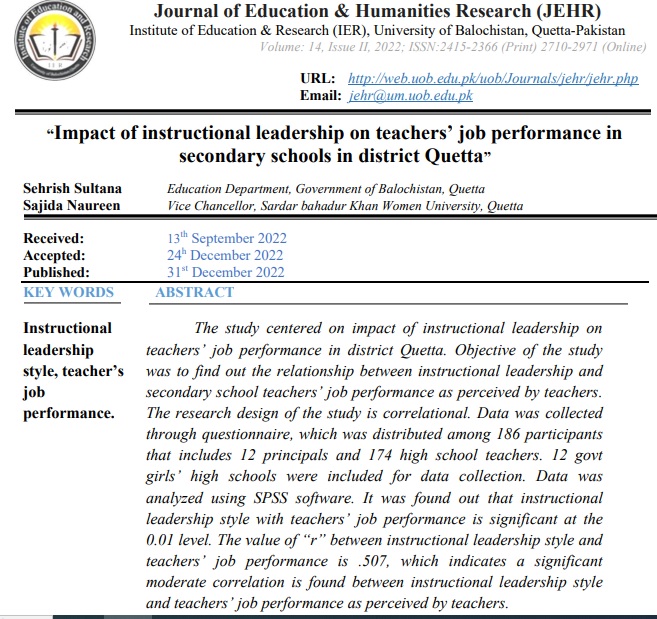Impact of instructional leadership on teachers’ job performance in secondary schools in district Quetta
Abstract
The study centered on impact of instructional leadership on teachers’ job performance in district Quetta. Objective of the study was to find out the relationship between instructional leadership and secondary school teachers’ job performance as perceived by teachers. The research design of the study is correlational. Data was collected through questionnaire, which was distributed among 186 participants that includes 12 principals and 174 high school teachers. 12 govt girls’ high schools were included for data collection. Data was analyzed using SPSS software. It was found out that instructional leadership style with teachers’ job performance is significant at the 0.01 level. The value of “r” between instructional leadership style and teachers’ job performance is .507, which indicates a significant moderate correlation is found between instructional leadership style and teachers’ job performance as perceived by teachers.
Key words: instructional leadership style, teacher’s job performance.
References
Ahmad, S. (2010). Leadership Crisis in Academia: Exploration and Measurement of Effective Academic Leadership (Doctoral dissertation, GC University Lahore).
Akram, M. J. (2010). Factors affecting the performance of teachers at higher secondary level in Punjab (Doctoral dissertation, Pir Mehr Ali Shah Arid Agriculture University Rawalpindi, Pakistan).
Ali, N. (2017). Teachers’ perceptions of the relationship between principals’ instructional leadership, school culture and school effectiveness in secondary schools in Pakistan/Niaz Ali (Doctoral dissertation, University of Malaya).
Bendikson, L., Robinson, V., & Hattie, J. (2012). Principal instructional leadership and secondary school performance. SET: Research information for teachers, (1), 2-8.
Bilal, A. (2012). Differential effect of content based and pedagogical training on teachers ‘professional development (Doctoral dissertation, University of the Punjab Lahore).
Blase, J., & Blase, J. (2000). Effective instructional leadership: Teachers’ perspectives on how principals promote teaching and learning in schools. Journal of educational administration, 38(2), 130-141.
Chamundeswari, S. 2. (2013). Job satisfaction and performance of schoolteachers. International Journal of Academic Research in Business and Social Sciences, 3(5), 420.
Emmanouil, K., Osia, A., & Paraskevi-Ioanna, L. (2014). The impact of leadership on teachers’ effectiveness. International Journal of Humanities and Social Science, 4(7), 34-39.
Enueme, C. P., & Egwunyenga, E. J. (2008). Principals’ instructional leadership roles and effect on teachers’ job performance: A case study of secondary schools in Asaba Metropolis, Delta State, Nigeria. Journal of Social Sciences, 16(1), 13-17.
Faisal, A. (2011). Impact of educational leadership on institutional performance in Punjab (Doctoral dissertation, Preston University, Kohat).
Fulmer, C. L. (2006). Becoming Instructional Leaders: Lessons Learned from Instructional Leadership Work Samples. Educational Leadership and Administration: Teaching and Program Development, 18, 109-129.
Graham, K., Hudson, P., & Willis, J. (2014). How can principals enhance teacher job satisfaction and work commitment? In Australian Association of Research in Education (AARE) Conference, Brisbane, Australia.
Hejres, S. K. (2018). Investigating the effectiveness of leadership styles on instructional leadership and teacher outcomes (Doctoral dissertation, Brunel University London).
Josanov-Vrgovic, I., &Pavlovic, N. (2014). Relationship between the school principal leadership style and teachers ‘job satisfaction in Serbia. Montenegrin Journal of Economics, 10(1), 43.
Jenkins, B. (2009). What it takes to be an instructional leader. Principal, 88(3), 34-37.
Khan, Z. (2012). Relationship between instructional leadership and teachers ‘job performance in secondary schools in the province of Khyber Pakhtunkhwa, Pakistan (Doctoral dissertation, Gomal University Dera Ismail Khan Khyber Pkhtoonkhwa-Pakistan).
Miller, R. J., Goddard, Y. L., Goddard, R., Larsen, R., & Jacob, R. (2010). Instructional Leadership: A Pathway to Teacher Collaboration and Student Achievement.
National education policy. (2017-2025). Government of Pakistan. Ministry of federal education and professional training Islamabad.
peña-lópez, i. (2009). Creating effective teaching and learning environments: First results from TALIS.
SHAIKH, F. (2015). Effect of primary school teachers perceived motivation on their performance in Sindh (Doctoral dissertation, Iqra University, Main campus, Karachi).
SHAH, F. U. H. (2013). Effect of continuous professional development teachers programme on the performance of primary school teachers (Doctoral dissertation, Qurtuba University of Science, and Information Technology KPK).
Şenol, H., & Lesinger, F. Y. (2018). The relationship between instructional leadership style, trust and school culture. IntechOpen.




